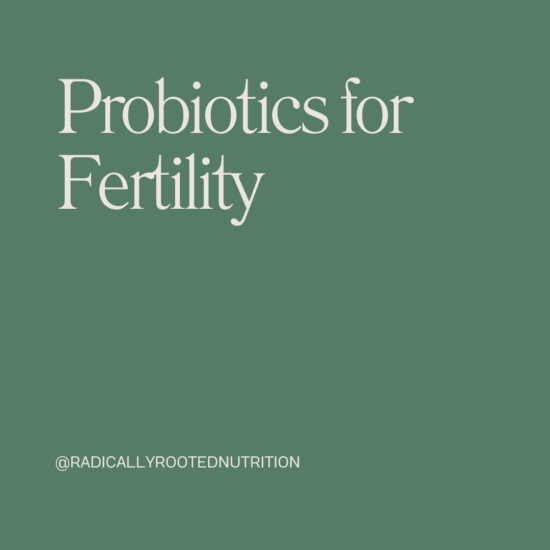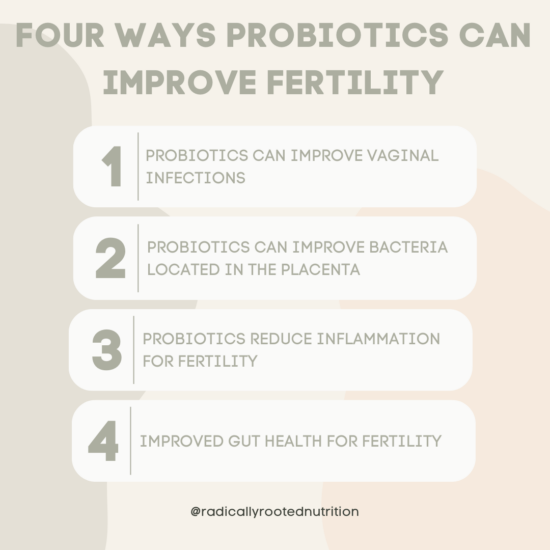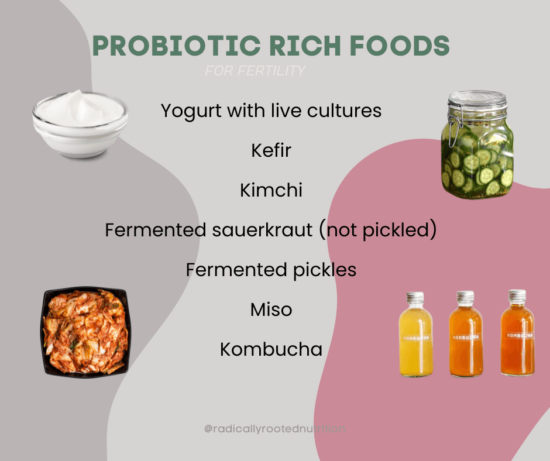4 Benefits of Probiotics for Fertility
As we are putting efforts in to optimize our chances of getting pregnant, we want to make sure we are doing everything we can to make this journey a positive and successful one. In my role as a registered dietitian, all of my recommendations are based on the most up-to-date research. Patients frequently ask about the potential benefits of probiotics for fertility. In this post, we’ll delve into the fascinating interplay between probiotics and fertility. It’s essential to be well-informed and understand the choices that align with both you and your future baby.
For those trying to conceive, one thing is certainly clear… microbes matter.
What are Probiotics?
I want you to think of your body as a really busy factory. Inside the factory, there are ‘guardians’ that make sure everything stays peaceful and running smoothly. These guardians represent probiotics. Probiotics are live bacteria and yeast that help with digestion by breaking down food, carrying it to where it needs to go and turning it into useful nutrients the body can absorb. Probiotics maintain a healthy balance between good and not-so-good bacteria, which is crucial for overall well-being. This balance not only affects digestion but also supports the immune system, hormone balance and inflammation (all of which affect fertility).
Not all probiotics are alike though, different types function differently throughout the body. The most frequently studied and recommended probiotics include Lactobacillus and Bifidobacterium species. Probiotics are found in both foods and supplements.
Can taking a probiotic improve fertility?
Considering the gut and vaginal microflora is not the first thing we think of when talking about infertility, but maybe it should be… The beneficial bacteria living in our body are responsible for many essential metabolic processes, like digestion of food, bio-availability of many types of vitamins, immune system regulation and providing a first line of defense against pathogens. These key functions all impact fertility. The better our digestion and absorption of nutrients, the better our body can fuel essential chemical reactions that balance our hormones. Hormone regulation is key when we are trying to conceive!

There are four specific areas of significance for research on probiotics for fertility:
Infections and Infertility: Probiotics Can Help
Bacteria in the Placenta: How a Probiotic Can Help
Probiotics Reduce Inflammation for Fertility
Improved Gut Health for Fertility
1. Infections and Infertility: Probiotics Can Help
Fertility and pregnancy can be negatively affected by infections in any organ system of the body, but infections of the vagina and reproductive system pose the greatest threat.
Studies have shown that bacterial vaginosis (BV) can have detrimental effects on fertility. Infertile women are three times more likely to have BV than fertile women. Women undergoing fertility treatments with BV are more likely to experience infertility.
Bacterial vaginosis (BV) is a condition that can lead to pre-term births and other pregnancy complications. Moreover, BV can reduce the success rate of in vitro fertilization (IVF) implantation. In 2016, a study revealed that BV is linked to pelvic inflammatory disease, which can spread to the fallopian tubes and cause fertility issues.
Along with BV countless other infections of the reproductive tract may potentially affect fertility and pregnancy. All of these infections are related either to the presence of pathogenic microbes in the vaginal tract, or the absence of protective ‘probiotic’ vaginal bacteria.
At the time of embryo transfer, the presence of specific probiotics is most likely to be successful at preventing infections.
Taking a probiotic supplement can boost your vaginal microbiome, with no side effects.
2. Bacteria in the Placenta: How Probiotics Can Help
The presence of bacteria in the human placenta has been a topic of debate and ongoing research. In the past, the human placenta has been viewed as sterile. Recent research has indicated otherwise – the placenta has been found to have bacteria present, which is thought to transfer to the baby while still inside the womb.
It is not known what the implications are for bacteria in amniotic fluid, but a pathogenic infection so close to a developing fetus is obviously not desirable.
In regard to bacteria in the womb, two key factors should be considered: first, microbial contact in the womb can impact fetal and placental immune health, and second, probiotic bacteria that are taken orally can reach the womb. As a result, taking a probiotic supplement can ensure that the bacteria present in the womb are beneficial rather than pathogenic and able to cause infection.
3. Probiotics Reduce Inflammation for Fertility
Inflammation can have a significant impact on fertility. Prolonged sub-chronic inflammation can disrupt menstrual cyclicity, and implantation, and lead to conditions such as endometriosis and polycystic ovary syndrome, which are associated with infertility. The widespread presence of inflammation is a sign that the immune system is out of balance. Conception can be more difficult when the immune system is on high alert because the body has evolved not to conceive under significant physical or psychological stress.
A 2022 study found that inflammation can disrupt the balance between estrogen and progesterone, leading to estrogen dominance and a relative lack of progesterone. Progesterone plays a crucial role in preparing and sustaining the uterus lining throughout pregnancy, particularly during the initial 8-10 weeks before the placenta takes over. Low progesterone levels are a common issue among women having fertility problems and are also frequently associated with early miscarriage.
Numerous clinical trials have demonstrated the effectiveness of probiotic supplementation in reducing systemic inflammation. These trials have examined different inflammatory markers present in the bloodstream and have shown how they can be positively influenced by introducing probiotics into the diet.
Studies have shown that probiotics, particularly those of the Lactobacillus species, have immunomodulatory effects and can influence the expression of anti-inflammatory cells in the placenta. Placental inflammation can result in pregnancy complications such as pre-eclampsia, so preventing it can reduce the chances of birth defects and miscarriages.
4. Improved Gut Health for Fertility
The gut microbiome, a complex community of microorganisms residing in our digestive tract, influences various physiological processes throughout the body. Emerging research suggests that a balanced and diverse gut microbiota may contribute significantly to reproductive health. A healthy gut environment positively impacts nutrient absorption, hormonal balance, immune function and inflammation – all critical factors for fertility. Imbalances in the gut microbiome can lead to conditions such as polycystic ovary syndrome (PCOS) and endometriosis, both of which can highly impact fertility.
An imbalanced gut microbiome may lead to inflammation and metabolic disruptions, potentially influencing fertility outcomes. Nurturing your gut health is a key consideration for optimizing your chances of conceiving.

So, what is the best Probiotic for Fertility?
As noted earlier, different types and strains of probiotics have varying effects on the body, depending on where that specific strain is located. In a healthy vagina, Lactobacillus species bacteria are the most dominant type of “good” bacteria.
There are specific strains that are known to benefit women’s health. These include:
- Lactobacillus rhamnosus GR-1
- Lactobacillus reuteri RC-14
- Lactobacillus crispatus
- Lactobacillus gasseri
- Lactobacillus iners
- Lactobacillus paracasei
These strains have been studied for their potential in supporting vaginal health and support women’s fertility. When choosing a probiotic, you want to choose one that contains some or most of these strains.
Foods that Contain Probiotics
Foods rich in probiotics that are beneficial for vaginal health include:
- Yogurt with live cultures
- Kefir
- Kimchi
- Fermented sauerkraut (not pickled)
- Fermented pickles
- Miso
- Kombucha

What about Prebiotics?
Probiotics work best if people are eating prebiotics as well. Prebiotics provide the “fuel” for the probiotics.
Foods rich in prebiotics include:
- leeks and onions
- asparagus and Jerusalem artichoke
- garlic
- whole wheat products
- oats
- soybeans
- bananas
Bottom Line
The research I have just discussed indicates that including probiotic supplements in your fertility plan can be beneficial to boost your immune system and fight infections both systemically and vaginally. It can also help reduce systemic inflammation which could be an important contribution to your overall health and fertility. Probiotic bacteria play a significant role in improving our overall health and may contribute significantly to our fertility.



